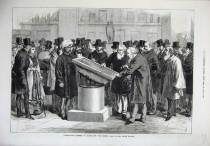November 30, 2013
Eating “in Chinese”
 Nowadays, I am translating a novel. The plot takes place in China and it mentions various dishes from that country’s gastronomy. Chinese cuisine is a sum of various regional traditions.
Nowadays, I am translating a novel. The plot takes place in China and it mentions various dishes from that country’s gastronomy. Chinese cuisine is a sum of various regional traditions.
This translation opened my appetite and yesterday I searched in my “dishes that I like to cook catalogue” and—from a list including 234 recipes that I have already prepared—I chose this Chinese Stir-Fried Seafood dish with king prawn, mussel, onion, bamboo, carrot, broccoli, soy sprout, baby corn, leek, pepper, mushroom, pea, lemon juice, sesame oil, ginger, curry, sugar, soy and oyster sauces, and rice wine.
[For information on my cookbooks translations cf. “Writers, Artists and Food Recipes”, March 15 2010; “Cuban Cuisine”, May 29 2010; “Cuban Creole Cuisine”, June 12 2010; “Recipes from Australia”, August 28 2010; “Cuban Christmas Cocktail”, December 25 2010; “Romans, Singers and More Food Recipes”, January 1 2011; “Healing Foods: Second Spanish Edition”, July 9 2011; “Speedy Suppers”, August 20 2011; “Soups & Sides”, September 3 2011; “Speedy Suppers: Spanish Translation”, February 11, 2012; “Soups & Sides: Spanish Translation”, February 18, 2012; “Fruity Puds: Spanish Translation”, February 25, 2012. Or click “Cuisine” on the Categories sidebar.
[Image: Chinese Stir-Fried Seafood. Photo from my “dishes that I like to cook catalogue,” March 9 2013.]
November 23, 2013
House Rules: How to Work?
 This is a personal issue, just like any other of each individual’s preferences, although there are some basic elements.
This is a personal issue, just like any other of each individual’s preferences, although there are some basic elements.
For example, since freelance translators stay at home, it is better to wear comfortable and cool clothes in the warmest months and warm clothes in the coldest, because that helps us to work with a more pleasant feeling.
We should also consider that it is convenient to stick to our daily meal schedule besides our necessary rest periods.
Our environment is as important as an adequate temperature. Good lighting, a proper level of silence, a comfortable chair where we can spend long periods of time working, an adequate posture of our body, creating the most favorable conditions to increase our concentration…
The list might be long, but it should be adjusted to our preferences and peculiarities.
The most important thing is to create an atmosphere that fosters our productivity to its maximum, while not sacrificing our sense of well-being. [1]
[1] Cf. also “House Rules: Daily Schedule,” September 14 2013; “House Rules: Working Hours,” November 2 2013; and “House Rules: How Much Work,” November 9 2013.
[Image: Albert Durer: Der heilige Hieronymus im Gahäus / Saint Jerome (patron saint of translators and interpreters) in His Study, 1514, engraving.]
November 16, 2013
Still More about Translating Ads
 I’m posting again about translating ads. It is an interesting subject because, frequently, I have had to debate with a client the wrong idea that translators must become ad writers when asked to translate this sort of text.
I’m posting again about translating ads. It is an interesting subject because, frequently, I have had to debate with a client the wrong idea that translators must become ad writers when asked to translate this sort of text.
These are two different professions, with different contents and different price lists.
The key to this problem is the fact that advertising any product or service should be written independently for any particular public (target) in its own language.
On the other hand, it is very difficult for an ad writer, for example, to work in Spanish for a Spanish-speaking public and, at the same time, keep in mind that this text is going to be translated, and make the work of the translator easier when writing their texts.
That is the origin of that feeling of dissatisfaction we all feel when we face translated ads.
Some other times, translators are expected to solve the lack of ad writers in other languages. [1]
Cf. also “Translating Ads,” April 30 2011 and “More about Translating Ads,” May 12 2012.
[Image: Experts Inspecting the Rosetta Stone in the British Museum, engraving published by the Illustrated London News, September 12, 1874, about the 2nd International Congress of Orientalists, which took place that year in the British capital.]
November 9, 2013
House Rules: How Much Work?
 An overworked translator is not actually a productive translator. From six to eight hours a day are more than enough to reach a 2,000-word good-quality translation goal. Fatigue does not help to achieve the levels of concentration we need to work properly.
An overworked translator is not actually a productive translator. From six to eight hours a day are more than enough to reach a 2,000-word good-quality translation goal. Fatigue does not help to achieve the levels of concentration we need to work properly.
Therefore, I have put into practice a two four-hour shift system with lunch and a one or one-and-a-half hour siesta in between. Since I get up early at 6:00 am, that means that I start working around 7:00 and have already finished working by 5:00 pm. I also take five- or ten-minute breaks every hour to take short walks around the house, have a mid-morning cup of tea or coffee and rest my eyes from my PC’s monitor.
Two thousand words in an eight-hour work day, five days a week, are enough. However, it all depends on your productivity. [1]
[1] Cf. also “House Rules: Daily Schedule,” September 14 2013 and “House Rules: Working Hours,” November 2 2013,
[Image: Antonello da Messina: San Gerolamo nello studio / Saint Jerome (patron saint of translators and interpreters) in His Study, c. 1774–1775, oil on wood.]
November 2, 2013
House Rules: Working Hours
 Today, I am back with the subject of work plans that I have already commented a few weeks ago. [1]
Today, I am back with the subject of work plans that I have already commented a few weeks ago. [1]
If we all agree with the need and usefulness of having a daily schedule, it also may be useful to consider a few questions related to how to distribute our daily working hours.
The model that I have always used is based on the idea of establishing fixed hours to develop the day’s activities; particularly, those with a professional character.
As freelance translator, I work with a daily 2,000-word translation goal. To reach that goal, I keep a strict work discipline based on a fixed schedule.
I do not believe it is necessary to adjust to a pre-established model, like Benjamin Franklin’s, which was my personal source of inspiration many years ago. I think that every plan—daily work schedule—should be adjusted to each one’s personal circumstances from the time to start, the intermediate hours and the time to finish. I do not think it is necessary to get up at 5:00 AM and go to bed at 1:00 AM as Franklin used to do. However, I do believe it is convenient to take into account our most productive hours and dedicate them to our work.
Getting up very early might be positive for some and yet negative for others. Working from morning to early evening or from early evening to late at night might improve or hamper the work of others. The secret is to develop—and keep—that daily schedule that better suits our personal characteristics.
[1] Cf. “House Rules: Daily Schedule,” September 14 2013.
[Image: Domenico Ghirlandaio: St Jerome in his Study, fresco, 184 × 119 cm (1480).